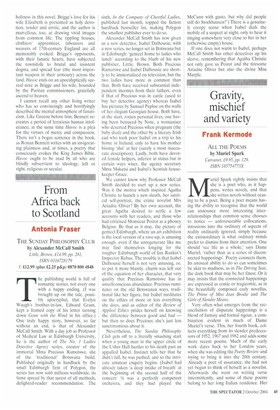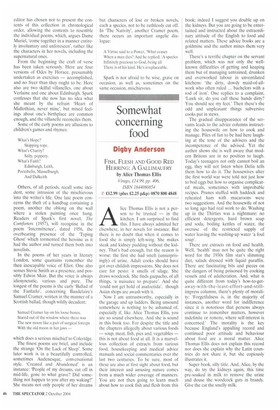Gravity, mischief and variety
Frank Kermode
ALL THE POEMS by Muriel Spark Carcanet, £9.95, pp. 129, ISBN 185754773X muriel Spark rightly insists that she is a poet who, as it happens, writes novels, and that she writes novels without ceasing to be a poet. Being a poet means having the ability to recognise that the world can announce more interesting interrelationships than common sense chooses to notice — unforeseeable collocations, intrusions into the ordinary of aspects of reality ordinarily ignored, simply because the extraordinary is what ordinary minds prefer to dismiss from their attention. One should 'see life as a whole,' says Dame Muriel, 'rather than as a series of disconnected happenings'. Poetry connects them. Its unusual ability to do so can sometimes be akin to madness, as in The Driving Seat, the dark book that may be her finest. Or it may insists that the connected happenings are expressed as comic or tragicomic, as in the beautifully composed early novellas, The Prime of Miss Jean Brodie and The Girls of Slender Means.
Very often what emerges from the reconciliation of disparate happenings is a blend of fantasy and formal rigour, a combination evident in much of Dame Muriel's verse. This, her fourth book, collects everything from its slender predecessors of 1952, 1967 and 1982 and adds some more recent poems. Much of the early work dates back to her London years, when she was editing the Poetry Review and trying to bring it into the 20th century. Already a poet of assurance, she had not yet begun to think of herself as a novelist. Afterwards she went on writing verse intermittently, and some of these poems belong to her long Italian residence. Her editor has chosen not to present the contents of this collection in chronological order, allowing the contents to resemble the individual poems, which, argues Dame Muriel, 'come together in a manner entirely involuntary and unforeseen', rather like the characters in her novels, including the supernatural ones. From the beginning the craft of verse has been taken seriously. Here are four versions of Odes by Horace, presumably undertaken as exercises — accomplished, and no freer than they ought to be. Here also are two skilful villanelles, one about Verlaine and one about Edinburgh. Spark confesses that she now has no idea what she meant by the refrain 'Heart of Midlothian, never mine', but mixed feelings about one's birthplace are common enough, and the villanelle reconciles them. Some of the early poems are allusions to children's games and rhymes: What's Hope?
Skipping rope. What's Charity?
Salty, peppery. What's Faith?
Edinburgh, Leith, Portobello, Musselburgh, And Dalkeith.
Others, of all periods, recall some incident, some intrusion of the mischievous into the writer's life. One late poem concerns the theft of a handbag containing a poem, another the oblong on the wall where a stolen painting once hung. Readers of Spark's first novel, The Comforters (1957), will recognise in the poem Intermittence', dated 1956, the overbearing presence of the 'Typing Ghost' which tormented the heroine as it had the author and turned them both into novelists.
In the poems of her years in literary London, some quatrains remember the then inescapable voice of Eliot. One also senses Stevie Smith as a presence, and possibly Edwin Muir. But the voice is always idiosyncratic, various and pure. The longest of the poems is the early 'Ballad of the Fanfarlo', concerning Baudelaire's Samuel Cramer, written in the manner of a Scottish ballad, though wildly decadent: Samuel Cramer lay on his loose bones. Stared out of the window where there was The new moon like a pair of surgical forceps With the old moon in her jaws — which does a serious mischief to Coleridge. The finest poems are brief, and include the strange 'On the Lack of Sleep'. Some later work is in a beautifully controlled, sometimes Auclenesque, conversational style. 'Created and Abandoned' is an instance: 'People of my dreams, cut off in mid-life, gone to what grave? Did something not happen to you after my waking?' She means not only people of her dreams but characters of lost or broken novels, each a species, not to be ruthlessly cut off. In 'The Nativity', another Cramer poem, there occurs an important angelic dialogue: A Virtue said to a Power, 'What ceases When a man dies? And he replied, 'A species Infinitely precious to God, being all There is of his kind. He's irreplaceable.
Spark is not afraid to be wise, grave on occasion, as well as, sometimes on the same occasion, mischievous.



















































































 Previous page
Previous page